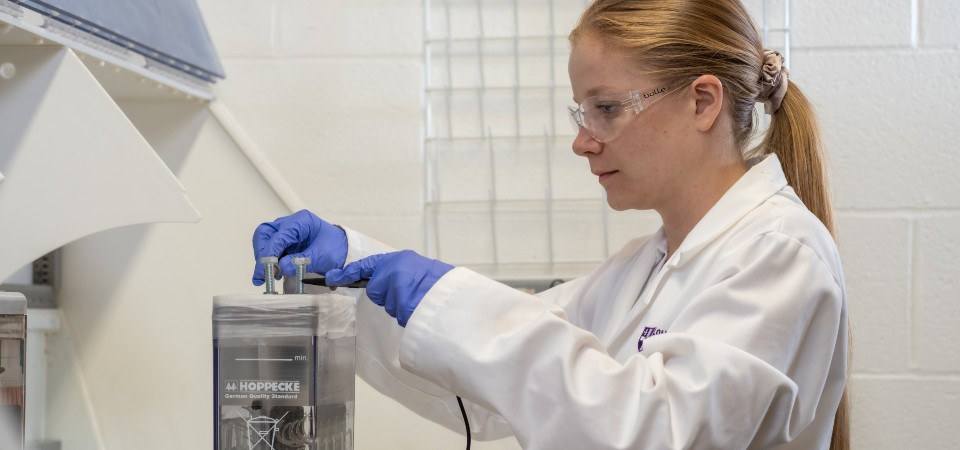The lead acid battery-electrolyser, developed by academics at the University, aims to provide access to clean cooking and renewable energy for those living in the continent’s most remote regions by producing electricity alongside a low-cost source of green hydrogen.
The battery-electrolyser is part of the wider LoCEL-H2 project which aims to create a scalable microgrid system to support two small sub-Saharan communities that currently lack consistent fuel sources for energy and clean cooking. It’s a novel hydrogen solution that will provide a sustainable, affordable and flexible renewable energy solution and storage for remote communities that cannot currently access an existing, reliable grid infrastructure.
Lecturer in Sustainable Energy Systems at Loughborough University Dr Jonathan Wilson explains the innovation: “Traditional electrolysers which produce hydrogen have a high capital cost. This means that to justify the upfront cost, they must run continuously. Our battery-electrolyser has a significantly lower capital cost because it is both a battery and an electrolyser. The battery stores the electricity that we’ve generated from renewable sources, such as solar. Once the battery is full, we can use the energy which would usually be thrown away to generate green hydrogen.
“Furthermore, this is the first battery-electrolyser based on lead chemistry. Lead is the world’s most recycled product which allows it to be cheaply and effectively recycled back into new battery-electrolysers at the end of its life.
“This green hydrogen has a range of uses but we’ll initially be using it as a replacement for charcoal in clean cooking. The battery-electrolyser will sit at the heart of the LoCEL-H2 project as it will help power these microgrids which will be located within these remote communities.”
Dani Strickland is a Professor of Electrical Power Engineering at Loughborough University. She says the biggest impact will be seen when using hydrogen to cook: “Many places in Africa use charcoal to cook, and there are health issues that are inherent with using that charcoal. This technology will help prevent this. The hydrogen produced by the battery-electrolyser does not only need to be used in cooking though – with potential uses in transport and other areas. It’s a real game changer.”
Dr Wilson adds: “Charcoal is very prevalent across Africa and it’s harmful as it’s essentially made by deforestation. This plant matter is burnt twice. The first burning happens out in the field and creates vast amounts of particulate matter, which comes down as smog and it's a very visible pollution problem.
“In the Ivory Coast, approximately 22,000 deaths a year are related to poor air quality, so by offsetting charcoal with our green hydrogen solution and green hydrogen cooking, we can help improve the air quality and prevent some of these respiratory based deaths.”
The project has been carried out in conjunction with several external partners – including the Consortium for Battery Innovation (CBI) – who produced the original LoCEL-H2 proposal for Horizon Europe.
CBI’s Senior Research and Innovation Manager, Dr Carl Telford says Loughborough’s work on the battery-electrolyser gave the project an added spark: “I happened to see a presentation by Professor Dani Strickland about this technology and it was exactly what we needed to make this project extra special. Previously, I had just been interested in storing electricity from renewable sources and batteries, but this clean cooking element was really important. We’ve now built up a brilliant relationship with the University and are working on a couple of different projects together.”
Professor Strickland says they wouldn’t have been able to achieve what they have alone. “We don't necessarily have the skills to go out to places like Zambia and the Ivory Coast to talk to the villages and really obtain the social acceptance that new technology needs to be successful. So, we need partners on the ground, we need people who know the community, we need people who understand the social sciences and the impact of bringing new technology. We need the experts from the battery industry who really understand lead acid batteries so that when problems occur, we have somebody there to help analyse results and then help suggest a solution. Also, having people who can communicate out the information, who can help manage the project and make sure that all the deliverables are met and all the paperwork is dealt with, is critically important.
“I have to say this is a phenomenal project. It's one of the most exciting projects I've ever done. The team is buzzing and there's a real level of excitement. There’s a real sense of being at the centre of something really important.”
Find out more about Loughborough University’s hydrogen research and innovation capabilities online.
